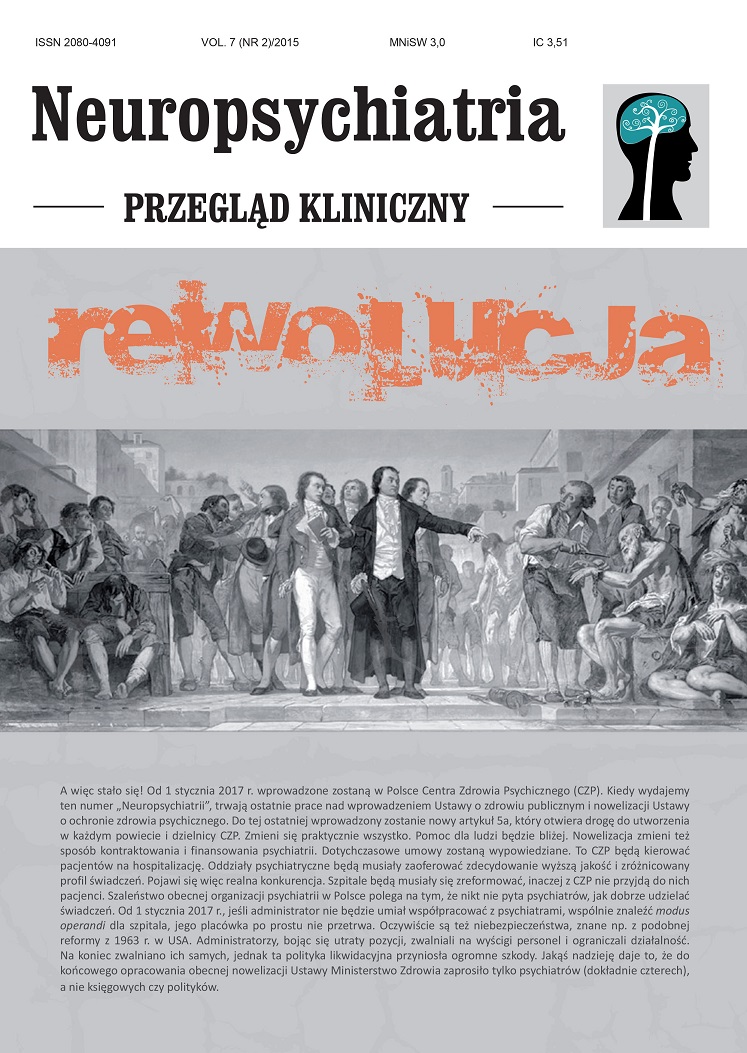Dementia in Alzheimer’s disease – the roles of caregivers in pharmacological treatment Review article
Main Article Content
Abstract
Communication with a caregiver constitutes a significant element of dementia treatment. It should focus on explaining the essence of Alzheimer’s disease, development of symptoms, encumbrances related to caregiving and, above all, on the possibility of obtaining the effects of pharmacological and non-pharmacological treatment. Important topics in communication involve also the aspects of out-of-home care as well as legal issues – incapacitation and institutionalization. By rising caregivers’ awareness of the influence the disease will have on them, communication with a caregiver should clearly indicate that it is essential for them to take care of their health, which should be supervised to the same extent as the health of a patient with Alzheimer’s dementia.
Article Details

This work is licensed under a Creative Commons Attribution-NonCommercial-NoDerivatives 4.0 International License.
Copyright: © Medical Education sp. z o.o. License allowing third parties to copy and redistribute the material in any medium or format and to remix, transform, and build upon the material, provided the original work is properly cited and states its license.
Address reprint requests to: Medical Education, Marcin Kuźma (marcin.kuzma@mededu.pl)
References
2. Kłoszewska I. Rola opiekuna chorych z otępieniem. Pol Przegląd Neurol 2007; 2: 105-109.
3. Bond J, Stave C, Sganga A et al. Inequalities in dementia care across Europe: Key findings of the Facing Dementia Survey. International Journal of Clinical Practice 2005; 59(Suppl. 146): 8-14.
4. Potemkowski A, Ratajczak M, Ratajczak A. Jak szybko rozpoznajemy chorobę Alzheimera? Psychogeriatr Pol 2007; l(4): 215-216.
5. Cooper C, Katona C, Orrell M, Livingston G. Coping strategies, anxiety and depression in caregivers of people with Alzheimer’s disease, International Journal of Geriatric Psychiatry 2008; 23: 929-936.
6. Witusik A, Pietras T. Lęk i depresja u opiekunów osób chorych na otępienia – badanie pilotażowe. Psychogeriatria Polska 2007; 4: 1-6.
7. Georges L, Jansen S, Jackson J et al. Alzheimer disease in real life – the dementia carer’s survey. Int J Geriatr Psychiatry 2008; 23: 546-551.
8. Morris RG. Factors affecting the emotional wellbeing of the caregivers of dementia suffers, British Journal Psychiatry 1988; 153: 147-156.
9. Potemkowski A. Współpraca między opiekunem chorego z otępieniem a lekarzem. W: Diagnostyka i leczenie otępień. Rekomendacje zespołu ekspertów Polskiego Towarzystwa Alzheimerowskiego. Medisfera, Warszawa 2012: 173-180.
10. Sobów T, Kłoszewska I. Choroba Alzheimera – leczenie. W: Diagnostyka i leczenie otępień. Rekomendacje zespołu ekspertów Polskiego Towarzystwa Alzheimerowskiego. Medisfera, Warszawa 2012: 82-93.
11. Jost BC, Grossberg GT. The evolution of psychiatric symptoms in Alzheimer’s disease: a natural history study. Journal of the American Geriatrics Society 1996; 44(9): 1078-1081.
12. Kłoszewska I. Farmakologiczne leczenie zaburzeń zachowania, zaburzeń psychotycznych i zaburzeń nastroju w chorobie Alzheimera. W: Diagnostyka i leczenie otępień. Rekomendacje zespołu ekspertów Polskiego Towarzystwa Alzheimerowskiego. Medisfera, Warszawa 2012: 94-105.
13. Martin-Carrasco M, Martin FM, Valero CP, Millan PL. Effectiveness of psychoeducational intervention program in the reduction of caregiver burden in Alzheimer’s disease patient’ caregivers. International Journal of Geriatric Psychiatry 2009; 24: 489-499.
14. Schmidt KL, Lingler JH, Schulz R. Verbal communication among Alzheimers’s disease patients, their caregivers, and primary care physicians during primary care office visits. Patient Education and Counselling 2009; 77: 197-201.

